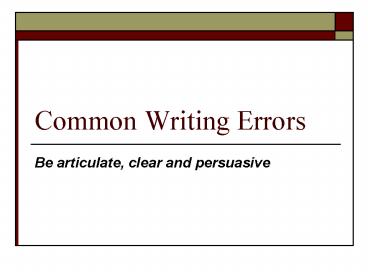Common Writing Errors - PowerPoint PPT Presentation
1 / 11
Title: Common Writing Errors
1
Common Writing Errors
- Be articulate, clear and persuasive
2
Introduction Whats the point?
- Your introduction directs your whole paper. It
states clearly what you intend to prove (hint
this is your thesis) and it lays out a plan for
accomplishing this. - Your introduction should contain a thesis
statement (which your body paragraphs will
support). Your conclusion should wrap up your
argument.
3
A Good thesis is.
- Not a Question (that is why it is a thesis
statement) - Takes one position and doesnt hedge its bets
- Specific and concise
- Crime must be stopped.
- vs.
- Our courts should hand out tougher sentences.
- Hemingway's war stories are really good.
- vs.
- Hemingway's war stories helped to create a new
prose style.
4
The flow of your paper.
- The standard format for an effective essay or
article is to - (1) present a coherent thesis in the
introduction, - (2) try your hardest to convince the reader of
your thesis in the body of the paper, and - (3) restate the thesis in the conclusion so that
the reader remains quite sure what your thesis
is, and so that the reader can decide whether he
or she was convinced.
5
A sentence has more than one word
- and a paragraph needs more than one sentence.
- Any one, two or three sentence paragraphs need to
be revised. Your paragraphs should have multiple
sentences, just the same as your essay needs
multiple paragraphs. - Your paragraphs shouldnt vary too much in length
if you have a paragraph that is more than one
page, or if you have a paragraph that is
significantly shorter than your other paragraphs,
REVISE
6
We are not having a conversation. in your essay
- Do not announce what you will be discussing (e.g.
In this essay, I will talk/discuss/write about
capital punishment) Just do it. (Capital
Punishment is wrong). - Do not address your reader in a formal paper
this may be appropriate and effective in a letter
or a personal piece of writing but it undermines
the tone of your formal essays. - REMEMBER Things may be clear in your mind, but
your audience can only read what's on the paper.
They cannot read what's in your mind. Make sure
you are as specific as possible in detailing your
thought process and reasons for your position.
7
Support, support, support
- The evidence (or reasons) you use to support your
argument decides whether or not you have an
effective paper. - You might have the most brilliant thesis in the
world, but if you fail to support it, your essay
will not be successful.
8
Huh? What does vague mean anyway.
- Be specific in the words you choose (5 points of
your whole essay is devoted to word choice!!). - There is a reason there are horror books and
movies called It and The Thing. - NOT Although the motorcycle hit the tree, it was
not damaged. (Is "it" the motorcycle or the
tree?) - NOT I don't think they should show violence on
TV. (Who are "they"?) - NOT George worked in a national forest last
summer. This may be his life's work. (What word
does "this" refer to?) - NOT If you put this sheet in your notebook, you
can refer to it. (What does "it" refer to, the
sheet or your notebook?) - (examples adapted from http//owl.english.purdue.e
du/handouts/grammar/g_pronuse.html)
9
Sentence Problems
- The deadly sentence starters (PLEASE DO NOT
USE!!!) - Then
- Also
- Now
- And
- Which
- So
- But (you can exchange However for most buts
But, that position is wrong. becomes However,
that position is wrong)
10
The semi-colon.
- If in doubt, dont use it. It is a stylistic
choice that can be overcome in a variety of ways.
- It is better to not use it at all than to use it
incorrectly (she went to the store, however she
forgot her wallet.)
11
Proofreading tips.
- Read your essay aloud If what you've written
sounds wrong to you, it's not going to sound any
better to anyone else. - Print your paper out for editing it is much
easier to identify errors that way - Type your essays spell check can be very helpful
if you struggle with spelling but dont rely on
it 100 - Identify your error pattern/problem areas.
Check your returned papers for any common errors
and look for those in your rough draft. - To help you focus on each line of your paper
individually, so that you will be more likely to
notice mistakes, you can use a ruler to move
slowly from line to line. You could also try
reading your paper backwards one line at a time.
Both of these techniques force you to focus on
each individual line rather than the overall
argument and organization of the - Ask a friend/family member/teacher to take a look
at your paper.You can read your paper aloud, or
ask them to read it aloud to you.

